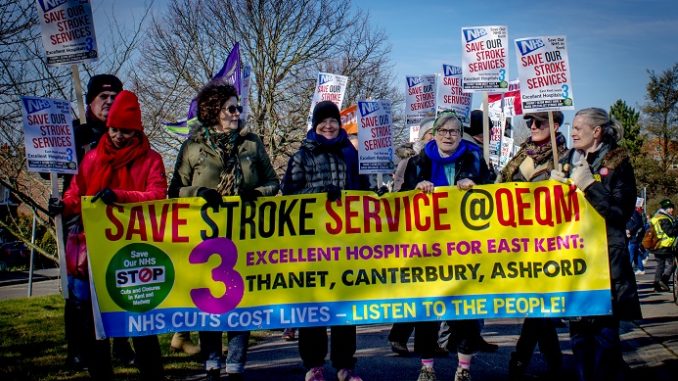
Plans for three hyper-acute stroke units in Kent and Medway are a step closer to going ahead – with services earmarked to be provided at William Harvey Hospital in Ashford for all east Kent patients.
The NHS in Kent and Medway – which includes all 8 Clinical Commissioning Groups – Bexley in south east London and the High Weald area of East Sussex drew up a shortlist of five options and has now announced Darent Valley Hospital, Maidstone Hospital and William Harvey Hospital have been chosen as preferred options for the specialist units.
General stroke services are provided in all the hospitals across Kent and Medway, including the QEQM, but there are currently no specialist hyper acute units. NHS bosses in the region say larger, specialist units in other parts of the country have been shown to improve outcomes for people who have had a stroke.
The decision means current services will likely be removed from some hospitals, including QEQM in Margate.
The NHS says hyper acute stroke units will reduce deaths as each will have a multi-disciplinary team of specialist stroke clinicians, seven days a week caring for patients in the critical first 72 hours.
The CCG group says the preferred option was identified following careful consideration of the responses to a public consultation, all the evidence and data gathered during the four-year review, and further detailed evaluation of five shortlisted options including trust proposals for implementation.
Next steps
The next stage in the review process is to develop a decision-making business case – a detailed document that will describe how the preferred option was selected and set out an implementation plan that will cover areas such as workforce, estates and capital requirement. A Joint Committee of the ten local NHS clinical commissioning groups that ran the consultation will examine this and then make a final decision on the future shape of urgent stroke services in January 2019.

Patricia Davies, the Senior Responsible Officer for the Kent and Medway Stroke Review, said: “Today’s announcement is an important step in the stroke review process. However, it is important to stress there are still several hurdles to clear before a final decision is made about the future of urgent stroke care in Kent and Medway.
“I would like to thank the hard-working staff at all our stroke units in Kent and Medway for their ongoing loyalty and dedication. I appreciate this is a time of uncertainty, but I believe there is an exciting future for everyone working in stroke services across Kent and Medway. The identification of a preferred option brings us closer to being able to deliver the first class care our stroke teams strive for.”
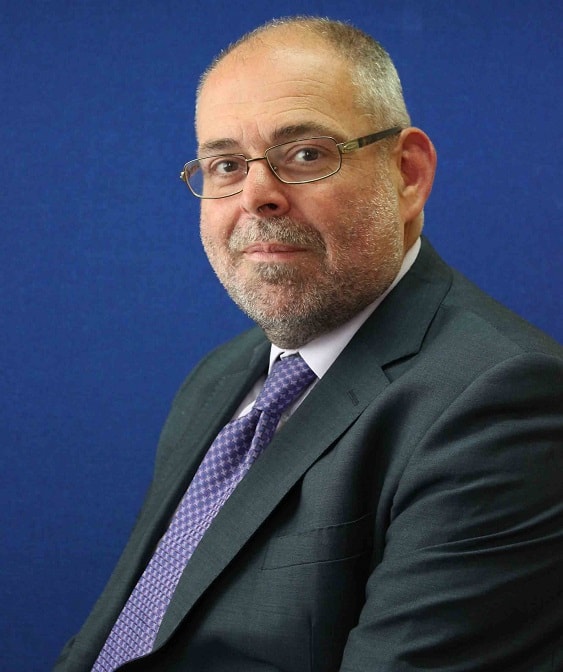
Glenn Douglas, accountable officer for the eight Kent and Medway CCGs, added: “The clinical committee was satisfied that the consultation did not identify any new evidence or viable new options that required a change to the consultation proposals.
“However, the responses to consultation emphasised important issues for consideration during the implementation of the final option. For example, people were concerned about travel times, relatives and carers visiting loved ones, effective rehabilitation close to home and the ability to staff the new units. These and other issues will all be considered in the detailed implementation plans for the final option.
“Some work to address these issues is already underway. For example, we are looking at how we can make sure effective rehabilitation services can be delivered locally and close to home for people once the immediate period of their care in hospital in a specialist unit is complete.”
Rehabilitation services
The NHS is also announcing details of a proposed new approach to rehabilitation for stroke patients. A key theme from the public consultation was that good quality, well-resourced rehabilitation services, in or close to home, were of vital importance to local people.
Over the next few months the NHS will be gathering views and feedback on the proposed new approach to rehabilitation from stroke survivors, their families and carers, front-line staff, local councillors and the public to help inform detailed implementation plans.
Further information will appear on the Kent and Medway NHS website at www.kentandmedway.nhs.uk/stroke.
Campaign against the proposals
But Thanet campaigners have been fighting the proposals, saying isle lives will be at risk because of journey times to Ashford. Members of Save Our NHS in Kent (SONIK) have consistently campaigned against the plans.
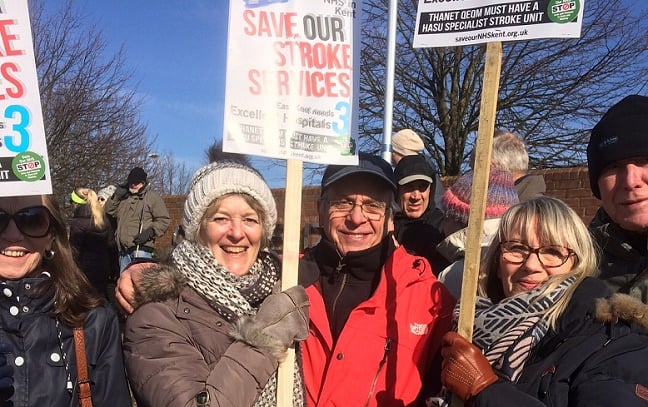
In a statement SONiK said: “This is very bad news for Medway and East Kent. If this is approved, patients will no longer be taken to QEQM, K&C or Medway Hospitals for stroke treatment in an emergency. The number of stroke units in Kent will be halved.
“Local Thanet MPs have failed to push effectively for a fourth unit at QEQM, despite pressure from the public and from SONIK. Residents of Thanet will be travelling 40 miles in an emergency for stroke care, and there is no evidence that this is safe, and the narrative that better care at the new units will mean this is safe has no basis in evidence either. This is an experiment on the people of Kent.
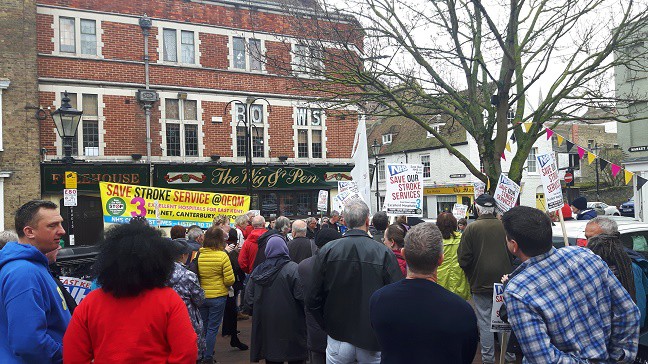
“Their own consultation results show the many concerns of medical staff and the the total lack of support for the plan in Thanet, the most adversely affected region. We believe it was a sham consultation, with a foregone conclusion.
“There is already emergency stroke care around the clock provided at QEQM hospital. There are already stroke specialists working at the unit. No other area in the UK so far has had this plan imposed with such long journey times. This is an experiment on the people of Kent.
“We advise local people to keep writing to their local MPs, and to come out out and protest with Save Our NHS in Kent. We do not intend to let these cuts to Thanet services go ahead, and we call on everyone to come out and show that Thanet says No!
“This decision is made on sand, and SONiK will be fighting on.”
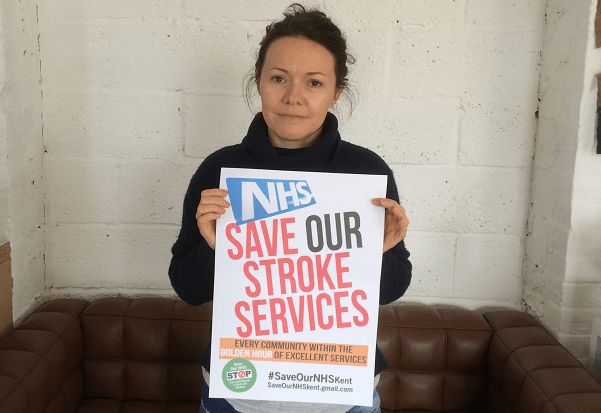
Carly Jeffrey, of SONIK, added: “The plan to replace our six Kent stroke units with just three ‘Hyper Acute’ Stroke units located at Dartford, Ashford and Maidstone is very bad news for the people of Medway and East Kent. Thanet in particular will really suffer.
“There was a special meeting of selected Kent County Councillors on September 5 to discuss this matter, but not one councillor from Thanet was invited to sit on that committee. There were councillors from Sussex, Bexley and Maidenhead, but no-one to represent the interests of Thanet. Elected representatives from outside the area had more say in this than those from the most adversely affected region – surely something is very, very wrong here.”
Find the campaign on facebook here

County councillor Karen Constantine, who sits on the health scrutiny committee, said a Judicial Review may now be called, adding: “This is a slap in the face for Thanet residents. This is an undemocratic decision as the CCG are not listening to the concerns of many thousands of Thanet people.
“There will be an adverse impact on stroke sufferers in Thanet if this decision goes ahead. We collected almost 6000 signatures from those who do not want to lose the Stroke service.
“I’m concerned for the patients on the Fordwich Ward at QEQM, many of whom are fragile and need a great deal of care and reassurance. I can’t see how they will manage the journey to either The Darent Valley or elsewhere.
“I’m concerned that staff will also be negatively impacted. Even if they are offered jobs at the other locations, it’s a great deal of travel. It will be an outrage to lose these talented, committed and well trained staff from our hospital.
“I urge the commissioners to get around the table to have more discussions. The wishes of locals must be taken fully into account as part of the DMBC – the decision making business case. Failing that we must call for a Judicial review.
““I’m pleased that Craig Mackinlay has finally been persuaded to see sense and join calls for a review of this perverse and universally unpopular decision. I sincerely hope that Craig will call upon his colleague Secretary of State for Health and Social Care Matt Hancock, to look closely at this decision.
“And I hope that he will scrutinise the DMBC – the decision making business case. Failing that we hope he will join Labour’s calls call for a Judicial review.”
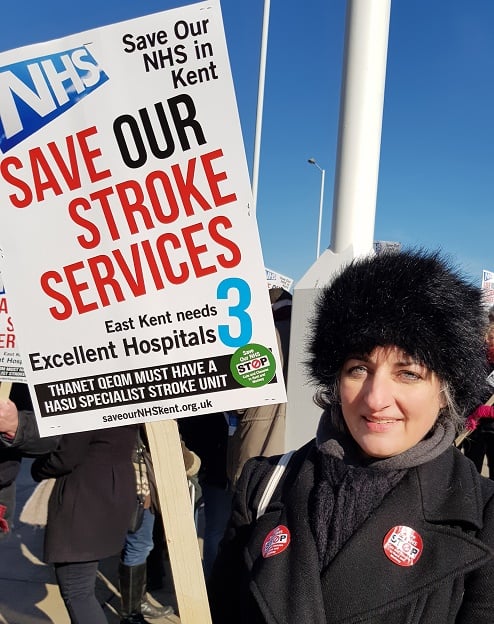
Labour’s South Thanet parliamentary candidate Rebecca Gordon-Nesbitt said: ““I am very disappointed that the preferred option for the location of stroke services in Kent fails to include Thanet.
“We have fought hard for Thanet to be considered within one of the five preferred options, and clearly this has not happened.”
“This decision represents a failure of the statutory duty of health commissioners to tackle health inequalities and a failure of the political will to fight for some of our most deprived communities.
“In addition, this represents disgraceful negligence on the part of Tory MP Craig Mackinlay. I believe people in Thanet will die and suffer lasting disability if they have to travel an hour to their nearest hospital.”

South Thanet MP Craig Mackinlay says the proposals should be looked at again to include a fourth HASU unit.
He said: “The option ‘B’ of Darent, Maidstone & Ashford as the sites of the 3 Hyper-Acute stroke units has long been trailed as the likely outcome, so I am not surprised by the announcement of the Kent and Medway NHS joint board. That does not mean that I am at all happy or convinced by the proposal.
“All will accept that the establishment of HASUs will enhance stroke outcomes with specialist teams available 24/7. It is further admitted by clinicians that current arrangements across 6 sites do not consistently meet standards of best practice.
“I can appreciate that the concept of ‘everything, everywhere’ is no longer possible or desirable as medical care advances, but given the growing population of Kent, with more than 100,000 additional homes likely over the next decade under the current round of local plans being finalised by local authorities, the question of geographical spread of HASUs becomes hugely relevant.
“We have long been told by government advertising as to the importance of the first hour and the FAST doctrine following a stroke. These proposals fo not fit with this advice for Thanet residents. It is a practical impossibility that travel to the William Harvey hospital in Ashford can be achieved in an hour, with poor road networks across East Kent. This means that Thanet residents become the most poorly served across the county under the plan.
“I call upon the NHS in Kent and Medway to look again at this proposal, as the only satisfactory outcome is a 4 centre option which upgrades QEQM to include a HASU for Thanet.”
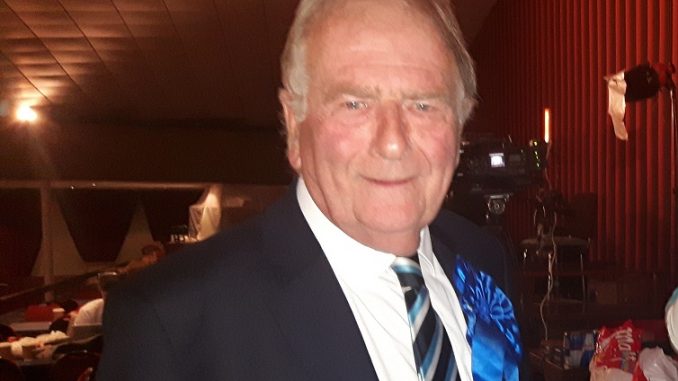
However North Thanet MP Sir Roger Gale has backed the decision and said it will save lives.
He said: “I believe that the distribution of all health services should be made on the basis of sound medical judgement and not upon emotion or party-political interest.
“I have discussed the location of services with those who are expert in the subject on a number of occasions – most recently a week ago – and I am satisfied that, given the planned safeguards, the decision taken and based upon three Centres of Excellence is the best practicable solution to provide the best patient survival and recovery rates – and that is what matters.
“Ordinarily a population of the size of Kent would be served by one or possibly two “hyper” centres but the geography of the county mitigates in favour of three in the selected locations.
“I know that people would like to have services on the doorstep but it is neither practicable nor possible to fund and staff everything everywhere. Notwithstanding the widely misinterpreted ‘FAST’ mantra what matters is that following diagnosis a patient is taken to the best possibly facility swiftly.
“Following stabilisation and expert treatment it is then necessary – and this is the safeguard- to re-patriate the patient to a facility (the QEQM or The Queen Vic in Herne Bay in the case of North Thanet) where family and friends can support recovery.
“I understand that this will not be a popular decision but good medical practice is not about populist campaigning but about making the right and sometimes hard choices in the interests of saving lives.
“In the case of stroke services, I am convinced that not only will more lives be saved but more and fuller recoveries will be made as a result of a decision that is not about ‘saving money’ – massive investment will be made in staff and equipment – but about delivering the best treatment in the best way for the maximum number of people. Time and experience will, I believe, justify this decision.”
The consultation
There were some 5,000 responses during the consultation period, which ran from February to April 20, which were analysed by DJS Research, an independent research consultancy.
DJS say the majority of people who took part in the consultation agreed that hyper acute stoke units should be established in Kent and Medway.
But the location of hyper acute stroke units, and travel times to the proposed units, were the key area of concern, with particular concern for people living in Thanet. Many felt the geography of the area meant that four units would be better in order to provide fair and equal access to all residents.
Many respondents in the CT postcode area – which includes Thanet -did not feel any of the options were suitable and said Kent and Canterbury Hospital or Queen Elizabeth the Queen Mother Hospital should be re-considered as part of the short-list.
Members of Save Our NHS in Kent (SONIK) may seek a judicial review over the decision.

